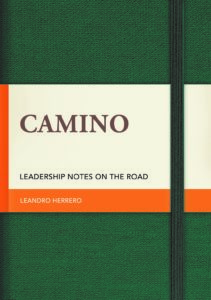Taken from my forthcoming book: Camino – Leadership Notes On The Road. Read NEW extract Chapter 1 part 2 [1]
The language of leadership is often plain and monotone. Used to explain slides, with a screen behind them, leadership language can be dull. I often sit in large corporate meetings and think that the TV weather forecast guy does a better job. There are many types of ‘leadership dialects’ but these 3 are quite relevant. This is why:
Factual, descriptive: ‘this is the strategic plan, these are the goals,and the challenges; this is what we need to achieve; this is the ambition’.This style is rather common. It’s based upon the assumption of the universal goodness of communication. It is informational. If coming from the very top, it may or may not contain a revelation, something new. I am always surprised by how much no-newness is included in some top corporate speeches. Of course, as usual, the value is in the ritual of the top leader addressing the troops. It is ‘hearing it from him’, more than hearing something new.
Aspirational: ‘we thought it would take us 3 years, here we are today.It’s possible, yes, we can do this; we are our own limits’. This dialect is pulling quite a lot of emotions. It helps with the visualisation of a destiny, small d or capital D. It’s not incompatible with the ‘factual dialect’ but goes well beyond. Obama is here in his acceptance and inauguration speeches.
Invitational: ‘come with me, I need you, let’s do it together; I can’t do it on my own’. It builds upon factual and aspirational, but it creates a new‘pull effect’. I am actually inviting you not just to understand the facts,not only to imagine a future, but to come with me and start walking. In my experience, in the corporate arena seeing and hearing leaders talk, these are my informal statistics of what I find: it is about 80% factual, 15% aspirational and 5% invitational. Many leaders simply forget the invitation.
Formal communication training often stops at the obvious: (1) style: be authentic, be yourself, be clear; and (2) content: have key messages, be on target, be specific.
The key question, however, on top of the above, is to know what behaviours you want to trigger. The factual dialect produces, perhaps, clarification, rational and emotional understanding. The aspirational dialect produces motivation. The invitational dialect is trying to trigger action. The invitational dialect is the most forgotten, yet potentially the most powerful. Don’t leave the room without an invitation to people. Small room, big room, small destiny, big destiny, invite, always invite.
________________________________________________________________________________________________
For more thoughts on leadership – look out for my forthcoming book….
Camino – Leadership Notes On The Road
Read NEW extract Chapter 1 part 2 [1]
A collection of notes on leadership, initially written as Daily Thoughts. Camino, the Spanish for road, or way, reflects on leadership as a praxis that continuously evolves. Nobody is ever a leader. Becoming one is the real quest. But we never reach the destination. Our character is constantly shaped by places and journeys, encounters and experiences. The only real theory of leadership is travelling. The only footprints, our actions. The only test, what we leave behind.
Available for pre-order this month!
To be notified as soon as pre-orders go live – email us at:
[email protected] [2]
Good leaders are good path makers. For me, a leader is the cartographer in chief who, whilst walking with others, also becomes an architect and a builder. If this is about journeys, and maps, and building, then there is almost no end to it.
On my imaginary journey inside my head, I took notes and articulated ideas. Most became my Daily Thoughts, a blog I have been running for years. This book is a collection of those notes. Don’t look for Harvard here, there are only harbours and other places that have generously adopted the content between them.
In this Camino (road in Spanish) of mine, I have also learnt to spot the real things, the fundamentals, the rocks. This is a collection of warnings, strong views and discoveries that I do not intend to be transferable. After all, the journey is not transferable, nobody can walk the Camino for you. Liberated by the idea that I don’t need to impart universal wisdom to end in a sterile case study and that I can share these notes and ideas, like one shares a meal without having to explain the chemistry of the ingredients, they are here in this book, still full of dust from my journey. The one I have only just begun.

________________________________________________________________________________________________